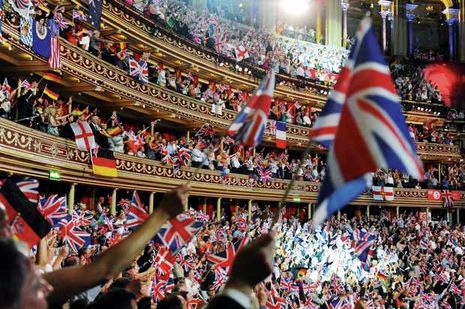The row over Rule, Britannia! is an opportunity for Britain to examine its past
Riannon Chaplin argues that neither a simple ban on the lyrics to Rule, Britannia! nor their usual patriotic celebrations address the need for introspection.

You could be forgiven for having forgotten about the BBC Proms. Amidst all of the panic and tragedy of this year, an eight-week summer season of daily orchestral classical music concerts was far from many of our minds, subsumed – like so much else – by the pandemic. But the show must go on: on 12th September, the Royal Albert Hall will once again host the Last Night, an occasion which, in any other year, would have marked the season’s soaring pinnacle; a venue alive with sound, an audience swept away by a surge of patriotic song into a sea of waving flags.
This year, however, things will be different. The ringing refrains of Rule, Britannia! and Land of Hope and Glory will be composed of a small group of BBC singers – a far cry from the usual 150-strong Symphony Choir, and one which came in the wake of the furore over the broadcaster’s decision not to sing them at all. But beneath the deafening roar of outraged headlines and affronted politicians, there is one truth that must not be allowed to drown: these songs celebrate a past we have not yet fully confronted. And the time to do so is now.
If our attachment to tradition as a means of understanding our history had not already been apparent, the recent Black Lives Matter protests provided for its stark exposure. The toppling in Bristol of a statue of Edward Colston, a 17th-century slave trader, sparked a debate over the importance of these structures to our national memory. If we recognise slavery as abhorrent, and imperialism as an outdated ideology founded upon social Darwinism’s belief in what Rule, Britannia! declares to be “less blest nations”, why does their dismantling cause such offence – even outrage?
“A form of patriotism which glorifies the gaps in our national memory is a dangerous trap into which to fall.”
The answer, I believe, lies beneath the surface of Boris Johnson’s fierce critique of the BBC’s initial decision, which was reversed by new director-general Tim Davie on Wednesday, 2nd September. Deeming the move an example of “cringing embarrassment” over British history, the Prime Minister asserted that it was time to stop our “general fight of self-recrimination.” This assertion encapsulates the paradoxical nature of our attachment to these songs: we hold them aloft as tangible reminders of a proud past, yet our understanding of their reality is at best flimsy, and at worst wilfully ignorant. Their lyrics capture a meaning that stretches beyond the sum of their words, that hearkens to the Anglocentric illusion of a Golden Age now past, but perhaps still within our grasp. And it is this wistful remembrance, more than anything, that should demonstrate the need to speak publicly, unreservedly, and consistently about the true nature of empire.
There is, of course, an argument to suggest that the Proms should not be made too political; that the Last Night is the cathartic, uplifting evening of patriotic good-cheer of which we are all in such desperate need. Indeed, there is nothing wrong with having pride in one’s country; the associations we may draw between the lyrics of both Rule, Britannia! and Land of Hope and Glory and such important events as the end of the Second World War are understandable, and speak once again to the strength and depth of feeling on this issue. But a form of patriotism which glorifies the gaps in our national memory is a dangerous trap into which to fall. Just as we question the legitimacy of using statues and monuments to proclaim our admiration for certain figures, are we not also right to question whether this particular tradition reflects our culture, our history – our society?
Finding solutions to such a complex, deep-rooted issue will require similarly difficult conversations for us all, and the willingness to make historical judgements free from the haze of national pride and the comforts of tradition. Make no mistake: the debate ignited this year is more explosive than any single event. I only hope the soaring symphonies of a rather different Last Night of the Proms will not be enough to stifle it.
A nation able to confront its history with an understanding of the dangers of failing to interrogate the past is one that can move forward, together, to build a better society; the row over Rule, Britannia! is a prime opportunity for us to pursue what has already been started. Long may it continue.
 Comment / Plastic pubs: the problem with Cambridge alehouses 5 January 2026
Comment / Plastic pubs: the problem with Cambridge alehouses 5 January 2026 News / Cambridge businesses concerned infrastructure delays will hurt growth5 January 2026
News / Cambridge businesses concerned infrastructure delays will hurt growth5 January 2026 News / Cambridge academics stand out in King’s 2026 Honours List2 January 2026
News / Cambridge academics stand out in King’s 2026 Honours List2 January 2026 News / AstraZeneca sues for £32 million over faulty construction at Cambridge Campus31 December 2025
News / AstraZeneca sues for £32 million over faulty construction at Cambridge Campus31 December 2025 Interviews / You don’t need to peak at Cambridge, says Robin Harding31 December 2025
Interviews / You don’t need to peak at Cambridge, says Robin Harding31 December 2025









